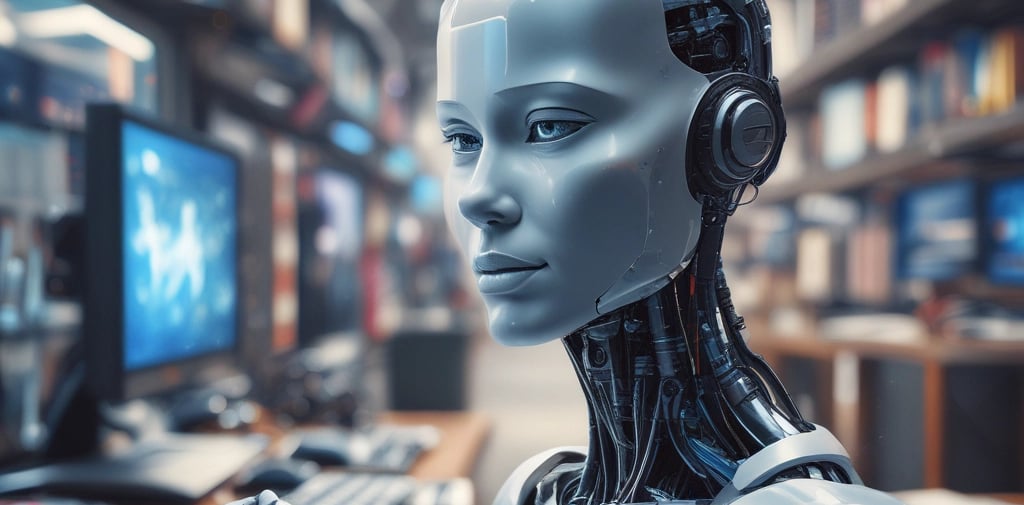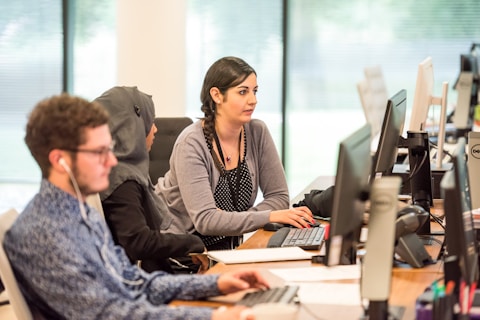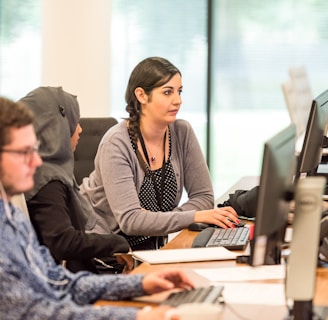10 High-Skill Jobs Facing AI Automation — Is Your Career Safe?
Discover the top 10 high-skill jobs AI could automate by 2030. Learn which careers are at risk and how to future-proof your skills in the AI-driven job market


Artificial intelligence (AI) is quickly changing the future of work. As AI tools and automation become more advanced, many jobs that people do today could soon be handled by machines. From simple tasks to more complex roles, AI is improving fast — and that means some careers may disappear or change by 2030. In this post, we’ll look at the top 10 jobs AI could take over in the next few years, how automation is replacing human workers, and what you can do to stay ahead. If you're curious about which careers are at risk from AI and how to prepare for the future, keep reading!
Related: 10 Best Free AI Girlfriend Apps of 2025 That Actually Feel Real
1. Data Entry Clerk
Data entry jobs involve typing information into computers, like names, numbers, or product details. These tasks are often simple and repetitive. AI can now do this much faster and without making mistakes. Many companies use software that can scan documents and enter the data automatically. Because of this, the need for human data entry workers is going down, and by 2030, many of these jobs could be replaced by machines.
💡 Tip: Learn basic computer skills like spreadsheets or data analysis. These are harder for AI to fully replace and can open up better job options.
2. Telemarketer




Telemarketers make phone calls to sell products or services, usually by following a script. But today, AI-powered chatbots and voice assistants can do this job too — and they never get tired or need breaks. These smart systems can talk to people, answer common questions, and even take orders over the phone. Because of this, many companies are starting to replace human telemarketers with AI.
💡 Tip: Improve your communication and sales skills. Moving into customer service or digital marketing roles can give you more long-term job security.
3. Financial Analysts
Financial analysts study market trends, company data, and economic information to help businesses make smart investment decisions. AI is getting better at analyzing large amounts of data quickly and spotting patterns humans might miss. Automated systems can now provide detailed financial reports and even predict market changes, which could reduce the need for some financial analysts in the near future.
💡 Tip: Develop skills in AI, data science, and strategic decision-making. Combining financial knowledge with technology can make you more valuable and future-proof your career.


4. Journalists and Reporters


Journalists and reporters gather information, write news stories, and keep the public informed. While this job requires creativity and critical thinking, AI tools are becoming increasingly capable of writing simple news reports, especially for routine stories like sports scores, weather updates, and financial summaries.
AI can analyze data, pull facts from multiple sources, and produce articles quickly — sometimes faster than humans. This means some parts of journalism, particularly repetitive or data-heavy reporting, could be automated. However, complex investigative journalism and in-depth storytelling still rely heavily on human skills.
💡 Tip: Focus on building strong investigative, analytical, and storytelling skills. Learning how to use AI as a tool to support your work, rather than compete with it, can help you stay ahead in this changing field.
5. Medical Diagnosticians


Medical diagnosticians analyze symptoms, medical images, and test results to diagnose diseases and recommend treatments. With advances in AI, computers can now review X-rays, MRIs, and lab results to identify patterns that might be missed by the human eye. AI systems can quickly analyze huge amounts of medical data, helping doctors make faster and more accurate diagnoses. While AI won’t fully replace medical experts soon, many diagnostic tasks, especially routine ones, could be automated by 2030, changing the role of medical diagnosticians.
💡 Tip: Stay updated on AI technology in healthcare and focus on skills like patient care and complex decision-making. Combining medical expertise with knowledge of AI tools will make you an invaluable part of future healthcare teams.
6. Software Developers


Software developers design, write, and test the code that powers websites, apps, and software programs. It’s a highly skilled job that requires creativity, problem-solving, and technical knowledge. However, AI is rapidly advancing in writing and debugging code through tools like AI-powered code assistants and automated testing systems.
These AI tools can generate code snippets, find errors, and even optimize software faster than many humans can. While developers will still be needed for complex and creative tasks, many routine coding jobs and testing processes are expected to become automated by 2030. This will shift the developer’s role towards overseeing AI tools, managing projects, and focusing on innovative problem-solving.
💡 Tip: Learn to work alongside AI by improving your skills in AI programming, machine learning, and project management. Understanding how to guide and use AI tools will help you stay relevant and take on more advanced development roles in the future.
7. Lawyers and Legal Researchers


Lawyers and legal researchers review cases, study laws, and prepare legal documents. This work requires deep understanding, critical thinking, and attention to detail. However, AI is becoming very good at analyzing large amounts of legal information quickly, finding relevant cases, and even drafting basic contracts or documents.
Legal research software powered by AI can help lawyers find precedents and spot important details faster than ever before. While AI won’t replace lawyers completely—especially when it comes to courtroom arguments and complex legal strategies—it is expected to take over many routine and research-heavy tasks by 2030.
💡 Tip: Develop skills in complex legal reasoning, negotiation, and client management. Learning to use AI legal tools can make your work more efficient and keep you valuable in the legal field.
8. Architects


Architects design buildings and spaces, combining creativity with technical knowledge to create safe and functional structures. AI is becoming capable of helping with many parts of this process, such as generating design options, optimizing layouts for energy efficiency, and even creating detailed blueprints faster than humans can.
AI tools can analyze large amounts of data to suggest better materials, cost-saving measures, and structural improvements. While architects will always play a key creative and decision-making role, by 2030 many routine design tasks and technical planning could be automated, changing how architects work.
💡 Tip: Focus on strengthening your creativity, project management, and client communication skills. Learning to work alongside AI design tools will help you produce better, faster designs and stay ahead in the field.
9. Teachers and Educators


Teaching is a human-centered profession that involves explaining ideas, guiding students, and adapting lessons to individual needs. However, AI is starting to play a big role in education. Intelligent tutoring systems, virtual classrooms, and personalized learning platforms can now adjust to each student’s pace and style. AI can grade assignments, track progress, and even provide instant feedback.
By 2030, many tasks that teachers do — especially repetitive ones like grading or basic instruction — could be handled by AI. Still, emotional support, classroom management, and mentorship are areas where human teachers remain essential.
💡 Tip: Focus on what AI can’t do — like building real connections with students, encouraging creativity, and fostering critical thinking. Also, learning how to use AI tools in your teaching can make your lessons more engaging and effective.
10. Accountants and Auditors


Accountants and auditors handle financial records, prepare tax documents, and make sure companies follow financial rules. These tasks require precision and attention to detail — exactly what AI is getting better at. Modern AI tools can now automatically track transactions, detect errors, flag suspicious activity, and even suggest tax-saving strategies.
By 2030, many routine accounting tasks like data entry, report generation, and audits could be mostly automated. While accountants will still be needed for complex analysis and advising clients, the role is shifting fast due to AI and automation.
💡 Tip: Build your skills in financial strategy, risk analysis, and using AI-powered accounting software. Focusing on advisory and decision-making roles will help you stay ahead in the finance industry.
Final Thoughts
AI is no longer just a tool — it’s becoming a major part of how work gets done. As we move toward 2030, even high-skill jobs are being reshaped by automation and intelligent systems. While this might sound worrying, it’s also a chance to grow. The key isn’t to compete with AI, but to work alongside it, using your human skills — like creativity, emotional intelligence, and complex decision-making — that machines can’t fully copy.
If your job is on this list, don’t panic. Instead, start learning new tools, adapting your skills, and staying curious. The future of work will still need people — just in smarter, more creative ways.
Let us know what you think about our article , share your thoughts below .. is AI gonna replace your job? let me know in the comment section below! see ya on the next one, thanks for reading.
